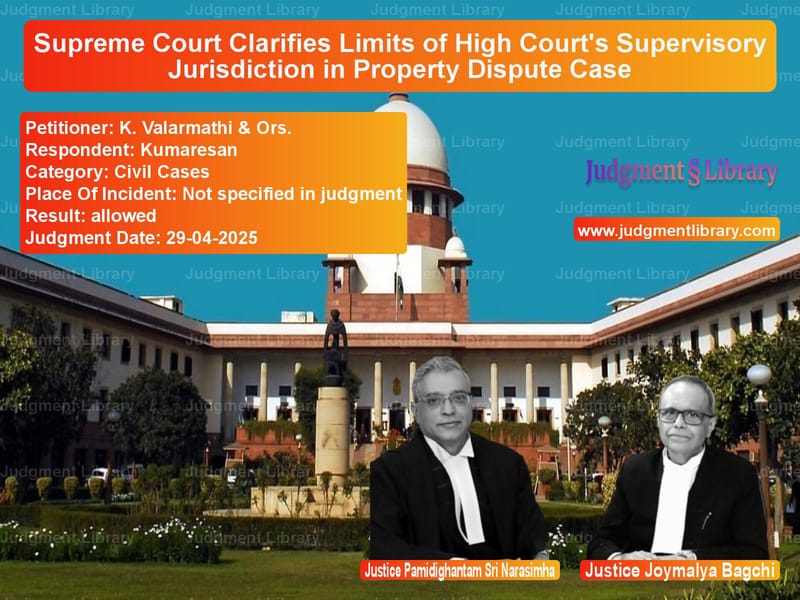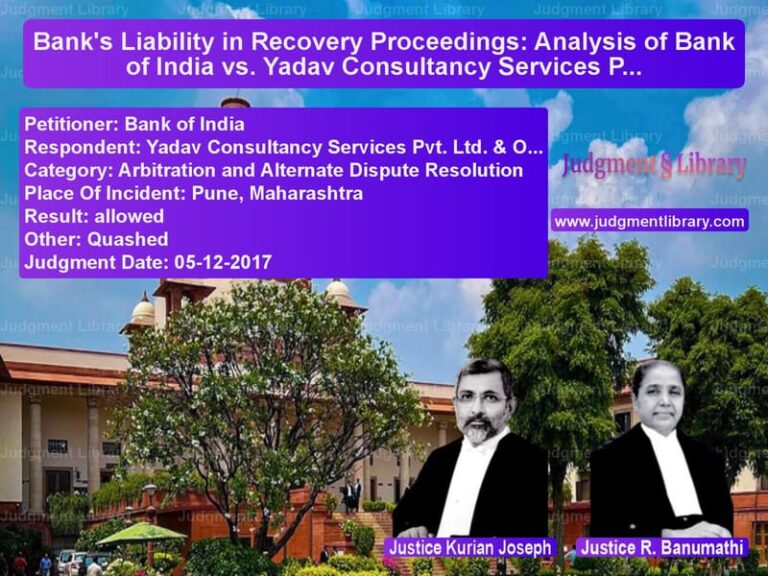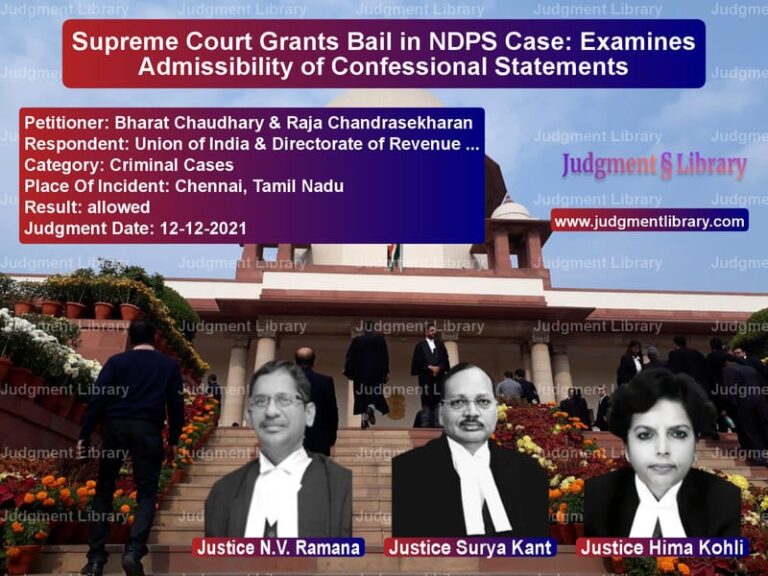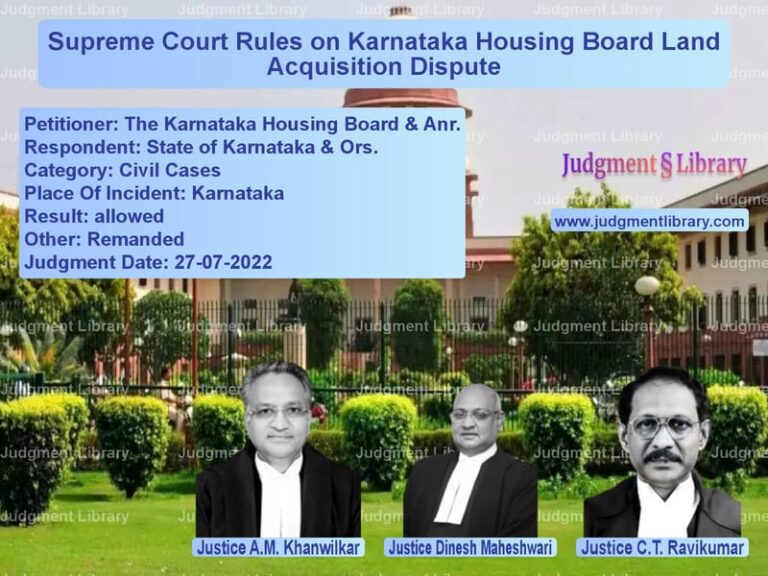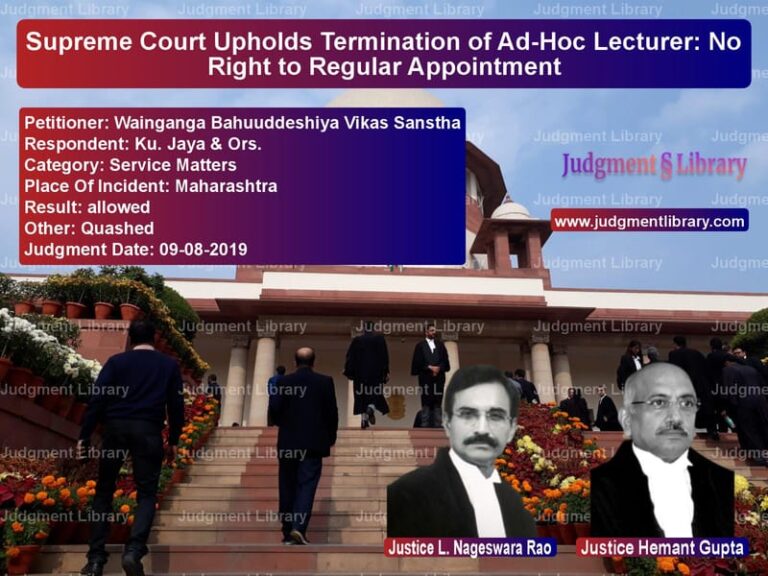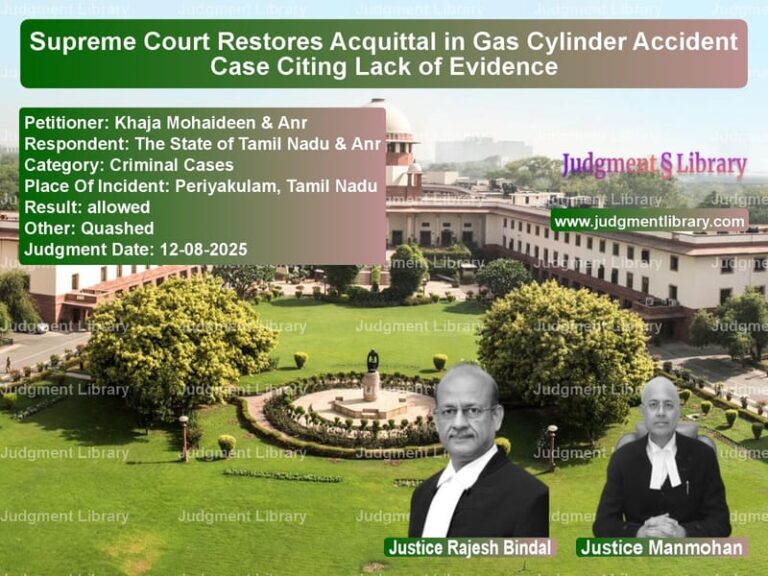Supreme Court Clarifies Limits of High Court’s Supervisory Jurisdiction in Property Dispute Case
The Supreme Court of India recently delivered an important judgment in the case of K. Valarmathi & Ors. vs Kumaresan, addressing the critical question of whether a High Court can reject a plaint while exercising its supervisory jurisdiction under Article 227 of the Constitution. The judgment, delivered by Justices Pamidighantam Sri Narasimha and Joymalya Bagchi on April 29, 2025, set aside the Madras High Court’s order that had rejected a plaint in a property dispute case, clarifying the boundaries of High Courts’ supervisory powers.
The case involved a complex family property dispute where the appellants, legal heirs of deceased Kathiresan, claimed ownership of certain lands that Kathiresan had allegedly purchased in the name of his nephew (the respondent) based on astrological advice. When the respondent initiated negotiations to sell the property, the appellants filed a suit seeking declaration of title and injunction. The High Court, in exercise of its powers under Article 227, rejected the plaint holding it was barred by the Prohibition of Benami Property Transactions Act, 1988.
The Supreme Court strongly disagreed with this approach, emphasizing that “Power of the High Court under Article 227 is supervisory and is exercised to ensure courts and tribunals under its supervision act within the limits of their jurisdiction conferred by law.” The Court further clarified that “This power is to be sparingly exercised in cases where errors are apparent on the face of record, occasioning grave injustice by the court or tribunal assuming jurisdiction which it does not have, failing to exercise jurisdiction which it does have, or exercising its jurisdiction in a perverse manner.”
The judgment made a crucial distinction between supervisory jurisdiction and original jurisdiction, stating that “Essence of the power under Article 227 being supervisory, it cannot be invoked to usurp the original jurisdiction of the court which it seeks to supervise. Nor can it be invoked to supplant a statutory legal remedy under the Civil Procedure Code, 1908.” The Court noted that the Civil Procedure Code provides a complete mechanism for rejection of plaints under Order VII Rule 11, which is appealable under Section 96, and this statutory scheme cannot be bypassed through Article 227 petitions.
In its reasoning, the Court observed that “In the present case, High Court has supervised the provisions of the Code when it rejected the plaint on the ground it was barred by law. In doing so, the High Court not only substituted itself as the court of first instance but also rendered nugatory a valuable right to appeal available to the appellant had the issue been adjudicated by the trial court in the first place.” This observation highlights the Court’s concern about maintaining procedural propriety and protecting litigants’ right to appeal.
The judgment also addressed the practical implications of such procedural shortcuts, noting that “Procedural law provides the necessary legal infrastructure on which edifice of rule of law is built. Short-circuiting of procedure to reach hasty outcomes is an undesirable propensity of an overburdened judiciary. Such impulses rendering procedural safeguards and substantive rights otiose, subvert certainty and consistency in law and need to be discouraged.”
While setting aside the High Court’s order, the Supreme Court clarified that it was not expressing any opinion on the merits of the benami transaction claim, leaving it open for the respondent to raise the issue before the trial court through appropriate proceedings. This balanced approach ensures that while procedural irregularities are corrected, substantive rights are not prejudged.
Petitioner Name: K. Valarmathi & Ors..Respondent Name: Kumaresan.Judgment By: Justice Pamidighantam Sri Narasimha, Justice Joymalya Bagchi.Place Of Incident: Not specified in judgment.Judgment Date: 29-04-2025.Result: allowed.
Don’t miss out on the full details! Download the complete judgment in PDF format below and gain valuable insights instantly!
Download Judgment: k.-valarmathi-&-ors.-vs-kumaresan-supreme-court-of-india-judgment-dated-29-04-2025.pdf
Directly Download Judgment: Directly download this Judgment
See all petitions in Property Disputes
See all petitions in Judicial Review
See all petitions in Judgment by P.S. Narasimha
See all petitions in Judgment by Joymalya Bagchi
See all petitions in allowed
See all petitions in supreme court of India judgments April 2025
See all petitions in 2025 judgments
See all posts in Civil Cases Category
See all allowed petitions in Civil Cases Category
See all Dismissed petitions in Civil Cases Category
See all partially allowed petitions in Civil Cases Category

